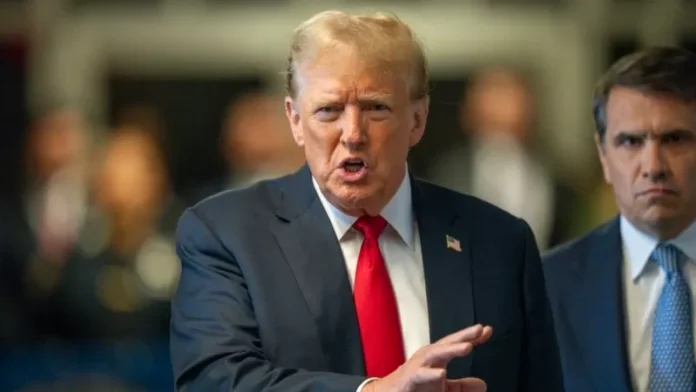Washington — On Tuesday, U.S. District Judge Aileen Cannon denied prosecutors’ request to bar former President Donald Trump from making public statements that could endanger law enforcement agents participating in his classified documents case in Florida. This decision comes after prosecutors argued that Trump’s baseless claims about the Biden administration wanting to kill him during a search of his Mar-a-Lago estate could lead to threats and harassment against law enforcement.
In her order, Cannon chided prosecutors for not giving defense lawyers enough time to discuss the matter before filing their request on Friday evening. She warned them that failing to comply with court requirements in the future could result in sanctions. However, she denied the request without prejudice, leaving the possibility for prosecutors to file it again.
A spokesperson for special counsel Jack Smith’s team declined to comment on the decision.
This latest development in the case comes as Trump’s lawyers were delivering their closing arguments in another criminal case against him in New York. This case involves a hush money payment to a porn actor during the 2016 presidential campaign.
The relationship between Cannon, who was nominated to the bench by Trump, and prosecutors has been tense. They have accused the former president of illegally hoarding classified documents at his Mar-a-Lago estate and obstructing the FBI’s efforts to retrieve them after he left the White House in 2021. Trump has pleaded not guilty and denied any wrongdoing.
Cannon has repeatedly criticized prosecutors in both hearings and court papers, even telling Smith’s team during one hearing that they were “wasting the court’s time.” In response, prosecutors have expressed their frustration with Cannon’s rulings, stating in a recent court filing that one of her requests was based on a “fundamentally flawed legal premise.”
The request from prosecutors came after Trump made a distorted claim earlier this week that the FBI agents who searched his Mar-a-Lago estate in August 2022 were “authorized to shoot me” and were “locked & loaded ready to take me out & put my family in danger.” This was in reference to a court document that revealed the FBI followed a standard use-of-force policy during the search, which prohibits the use of deadly force unless there is an imminent danger of death or serious physical injury to the officer or another person.
Prosecutors argued that Trump’s false suggestion that federal agents were involved in a plot to assassinate him could expose law enforcement officers to threats, violence, and harassment. They urged the judge to bar Trump from making any comments that could endanger law enforcement agents involved in the case.
However, defense attorneys argued that this restriction on Trump’s speech was unconstitutional and pointed out that the identities of law enforcement officers in the case are subject to a protective order preventing their public release. They also stated that they had asked Smith’s team to meet on Monday to discuss the matter before prosecutors filed their request, but the situation was deemed urgent and could not wait until Monday.
A spokesperson for Trump’s campaign, Steven Cheung, released a statement on Tuesday, calling the entire documents case a “political sham” and stating that it should be thrown out entirely.
This is one of four criminal cases that Trump is currently facing as he seeks to reclaim the White House. However, it is uncertain if any of the cases, aside from the ongoing New York hush money prosecution, will reach trial before the November election.
In two of the other cases, Trump has already had restrictions placed on his speech due to incendiary comments that officials say threaten the integrity of the prosecutions. In the New York case, he has been fined and threatened with jail time for repeatedly violating a gag order that prohibits him from making public statements about witnesses, jurors, and others involved in the case. He is also subject to a gag order in his federal criminal election interference case in Washington, limiting what he can say about witnesses, lawyers, and court staff. However, an appeals court has allowed him to speak about special counsel Smith, who brought the case.
Despite these restrictions, Trump continues to make false statements and smear law enforcement officers involved in the case. It is clear that his actions are causing unnecessary tension and putting the safety of law enforcement at risk. The decision by Judge Cannon to deny the request to restrict Trump’s speech is a reminder that the rule of law must be upheld and that no one, not even a former president, is above it.

